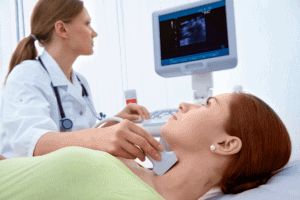Need to Know
- There are no dietary restrictions or prep for this ultrasound
- You may be asked to remove neck/ear accessories
- You may be asked to change into a gown
Nice to Know
- The exam is painless, non-invasive, and there are no known side effects
- Our experienced and caring sonographers who will be performing your exam are specifically accredited in Ultrasound, and have been trained on our state of the art equipment
- The exam may take anywhere from 30 minutes to 60 minutes
Ultrasound: What to Expect
Frequently Asked Questions
Why Is A Carotid Ultrasound Exam Done?
Carotid ultrasound is used to evaluate for plaque and blood flow obstructions in the carotid artery. It can be used to assess the risk factor for stroke and can also be used post-operatively to verify the success of interventional procedures.
How Does Carotid Ultrasound Imaging Work?
Ultrasound imaging uses high-frequency sound waves to produce ultrasound images of the body’s tissues, structures, and blood flow. A transducer/probe and ultrasound gel work together to transmit and receive sound waves to produce images on the monitor. The transducer sends sound waves into the body, and the echoes are used to create images of the blood vessels in the side of your neck.
What Will Happen During The Carotid Ultrasound Exam?
Warm, water-based gel will be applied to the ultrasound transducer or directly on the skin. The sonographer will then move the transducer around to obtain clear images of the underlying structures for the physician to interpret. The sonographer presses the transducer against the side of your neck to capture detailed images of the carotid artery and assess blood flow.
How Should I Prepare For A Carotid Ultrasound?
Before the test is administered, you may be asked to change into a gown and remove any neck/ear accessories.
What Are The Benefits And Risks Of Carotid Ultrasound?
The benefits of Carotid Ultrasound:
- Ultrasound images can be shown in real-time as they happen.
- The exam is painless and non-invasive.
- No ionizing radiation is used for this procedure.
Risks you should be aware of:
- There are no known risks for ultrasound.
Additional Information
A carotid ultrasound exam typically takes about 30 minutes. It can help detect blood clots, plaque buildup, and other abnormalities that increase the risk of stroke. Using Doppler ultrasound, the exam can also assess the movement of blood cells within the blood vessels. Patients with high blood pressure or other risk factors for heart disease and stroke may benefit from this imaging test to monitor their carotid arteries and overall vascular health.
Locations
Avon Imaging Center
100 Simsbury Road, Suite 101Avon, CT 06001
Monday, Wednesday & Friday | 8:30am - 4:30pm
Tuesday & Thursday | 8:30 AM to 8:00 PM
Weeknight and weekend appointments available for MRI
Hours Vary by ExamMore Information
Bloomfield Imaging Center
6 Northwestern Drive, Suite 102Bloomfield, CT 06002
Hours Vary By Exam
Monday - Friday | 8:30am - 4:30pm
Weeknight appointments available for MRI until 10pmMore Information
Enfield Imaging Center
100 Hazard Avenue, Suite 100Enfield, CT 06082
Monday - Friday | 8:30am - 5:00pm
Weeknight appointments available for MRI
Weekend appointments available for Mammography
Hours Vary by ExamMore Information
Farmington Imaging Center
399 Farmington AvenueFarmington, CT 06032
Monday - Friday | 8:00am - 4:15pm
Weeknight and weekend appointments available for MRI
Weeknight appointments available for Mammography
Hours vary by examMore Information
Glastonbury Imaging Center
704 Hebron Avenue, Suite 100 (Access to building off Oakwood Drive)Glastonbury, CT 06033
Monday - Friday | 8:30am - 4:30pm
Weeknight appointments available for Mammography and MRI
Hours vary by examMore Information
Hartford Imaging Center
85 Seymour Street, Suite 200Hartford, CT 06106
Monday - Friday | 8:00am - 4:00pm
Hours Vary by Exam
More Information
West Hartford Imaging Center
941 Farmington AveWest Hartford, CT 06107
Monday - Friday | 8:30am - 4:00pm
Weeknight and weekend appointments available for Mammography and MRI
Hours vary by examMore Information
Wethersfield Imaging Center
1260 Silas Deane Highway(Suite 100: CT & MRI | Suite 104: All Other Exams)
Wethersfield, CT 06109
Monday - Friday | 8:30am - 4:30pm
Weeknight and weekend appointments available for MRI
Weeknight appointments available for Mammography
Hours vary by exam.More Information

 Carotid ultrasound is a diagnostic imaging technique that uses high-frequency sound waves to produce images of the carotid arteries and the moving blood within them. Carotid arteries are blood vessels located on both sides of your neck which carry blood to the brain.
Carotid ultrasound is a diagnostic imaging technique that uses high-frequency sound waves to produce images of the carotid arteries and the moving blood within them. Carotid arteries are blood vessels located on both sides of your neck which carry blood to the brain.






